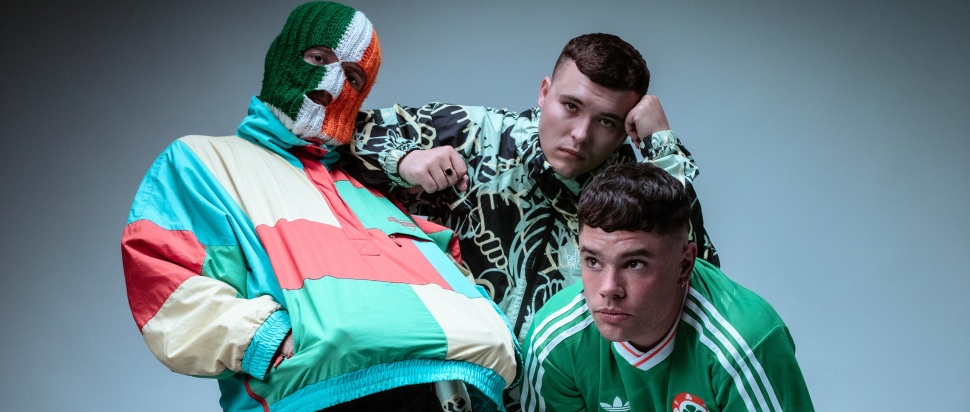Irish rappers Kneecap are about to be movie stars
We catch up with two-thirds of Belfast rap group Kneecap ahead of the release of their boisterous and politically sharp eponymous biopic. They discuss the Irish language, Belfast movie clichés and Michael Fassbender's inappropriate apparel
Mo Chara is on a roll: “The fact we rap in Irish, where we're from, is inherently political. And the reason that's political is because of 800 years of colonialism, and the penile laws that outlawed the Irish language…”
“Penal,” interrupts Moglaí Bap. “Penal laws.”
“Penal?” asks Mo Chara. “What was I saying? Penile? Is that like your cock?”
Both members of West Belfast rap trio Kneecap (minus their tricolour balaclava-wearing producer DJ Provaí) are now in hysterics in a backroom of the Glasgow Film Theatre – wearing trackies and necking pints – ahead of a screening of their smart and irreverent eponymous biopic.
This is what it’s like to speak to the Kneecap lads. They’ll sophisticatedly recount the history of how Irish culture has been stamped down by British imperialism, and then fall about laughing at a dick joke. They’ll discuss the sectarian divide in Belfast and in the west of Scotland, and how their music has succeeded in bridging that gap, while – as they did at the GFT – burping and farting. Passion and knowledge punctuated by a lowbrow punchline and their larger-than-life personalities.
That’s one of the reasons they’re so convincing playing heightened versions of themselves in Kneecap, and why their unashamedly ‘Brits out’ music has won a fervent following, and criticism that almost amounts to censorship from the humourless authorities (their songs have been banned on RTÉ, and former business secretary Kemi Badenoch recently intervened to stop them receiving a UK arts grant). The film expertly ties their public arc and the storytelling in their songs together.
Written and directed by Rich Peppiat, Kneecap eschews the standard biopic formula and steers away from straight documentary to get at a larger truth about the boys and their musical origins – but also about trauma, family, community, class, religion and geopolitics. Stranger-than-fiction details – like the opening scene depicting Moglaí Bap’s baptism at a wooded Mass rock under police helicopter lights – and plotlines involving a hapless paramilitary group called the Radical Republicans Against Drugs swirl in the mixer until it’s unclear what’s real and what’s creative licence (at least until the credits roll). In style, it’s kaleidoscopic and kinetic, like Nida Manzoor’s work on We Are Lady Parts, and in concept, it’s closer to Todd Haynes’ I’m Not There.
“[Peppiat] understood we’d been building this world of characters,” says Mo Chara. “So many people were approaching us to make a film or a TV series, but none of them got that we’re performers and tell stories [like Peppiat did]. He saw that potential in us.”
The plot follows Mo Chara and Moglaí Bap as they have run-ins with the “peelers”, dissidents, and a teacher who became their producer. The film doesn’t spoon-feed you the history of the Troubles. Instead, it follows Kneecap as they carve out a space for their music and try to transcend the politics of where they were born. It opens with the rote image of a car bomb, before Mo Chara butts in to tell the viewer directly this won’t be that kind of Belfast film.
“Every play, film, and TV series set in Belfast is normally set in the 70s and 80s, during the Troubles,” says Mo Chara. “But it's a bit of poverty porn. ‘Poor war-torn Belfast, where they're all fucking idiots.’ We didn't want that. These characters are political against their own will essentially because of where they're from.”
Moglaí Bap’s dissident dad is played by Michael Fassbender, who sends up his portrayal of Bobby Sands in Hunger, bringing a comedic over-seriousness to the role. The film is ridiculously funny, and both are excited to witness how it goes down with a Glasgow audience.
Perhaps no joke is as funny as the anecdote Moglaí Bap tells me about Fassbender’s trip to Belfast bar Madden’s: “They don’t let you in if you’re not wearing the right clothes. And here Fassbender rocks up wearing a tracksuit. And there’s the wee fella Tom on the door – he’s tiny, but he’s strong as fuck. Scary dude. He’s like to me, ‘No, no, he’s not getting in with that on.’ I don’t think he even knew who he was.”
Mo Chara chimes in: “He wouldn’t give a fuck anyway – he's not getting in with that tracksuit!”
What the film does tackle earnestly is Irish speakers’ campaign to have the language legally recognised. Moglaí Bap didn’t speak English until he went to school, and the film – and Kneecap’s existence as an Irish-language rap group – is bringing overdue attention to communities that want (and need) the language’s resurgence to continue.
Back to those penal laws. “Politicisation of the language has been forced upon us by the oppressor,” says Moglaí Bap. “It’s seen as IRA culture warfare, when actually all we want is not to feel ostracised, for all government-provided services to be in Irish so a mother can take her child to the doctor without a fucking intermediary to translate. I was raised speaking Irish, just like you speak English. It should be just a language people survive in, socialise in, make art, music, community – and that's it.”
Kneecap is released 23 Aug by Curzon
The band will be at GFT on 20 Aug for a preview of Kneecap
